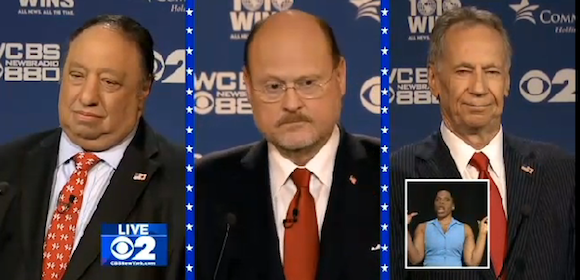
At last night's Republican mayoral debate, the candidates -- Gristedes owner John Catsimatidis, former MTA chair and Giuliani deputy mayor Joe Lhota, and Doe Fund founder George McDonald -- offered a few glimpses into what transportation policy might look like under a GOP mayor. McDonald, who was until last year a registered Democrat and is trailing in the polls, trumpeted his more aggressive stance on livable streets issues, while leading candidates Lhota and Catsimatidis were far more cautious, and sometimes outright hostile, when it came to street safety interventions.
The first of the night's two transportation questions came from Marlene Peralta of La Prensa, who asked the candidates if they would reopen Broadway in Times Square and Herald Square to car traffic.
Lhota said he wouldn't want to bring back car traffic immediately after taking office, but would evaluate the plazas -- "make sure traffic moves, why lights aren't in sync," he said -- before making a decision. "Macy's will tell you: They didn't have a whole lot of conversation with the City of New York," Lhota said. "Nobody in the city of New York had any idea of what the vision was on the part of the mayor and his transportation commissioner."
For those who might have forgotten, before the plazas were made permanent in 2010, surveys from the Times Square Alliance business improvement district found that the majority of property owners and retail managers supported the program. In Herald Square, the 34th Street Partnership, which also represents local businesses and property owners, is working with the city to bring more improvements to the pedestrian space there.
Like Lhota, Catsimatidis said he would re-study the Times Square plazas and meet with nearby communities. Echoing Anthony Weiner, he said reducing sections of Broadway to one through car lane has negative impacts on emergency response. McDonald, who said he would keep the plazas, jumped in with a rebuttal: "There's no place an ambulance or a fire truck can't get by," he said.
Catsimatidis opposed congestion pricing, saying it would "punish the outer boroughs." Calling the Verrazano-Narrows Bridge toll "ludicrous," McDonald repeated his endorsement of the Move NY "fair toll" plan, which would add tolls on free bridges to Manhattan and reduce them on bridges linking other boroughs. He also said the city should have control of New York City Transit and MTA Bridges and Tunnels. Lhota, who's been pushing the idea that the city should control MTA bridges and lower tolls (the funds from the MTA-tolled bridges support transit), did not mention the issue last night.
CBS 2's Maurice DuBois asked the candidates whether there should be more or fewer red light cameras in the city. McDonald said there should be more, especially near schools, while Lhota said, "There should be more; not many more." Catsimatidis said there should be more, as long as they are not used primarily as a revenue-generating scheme.
In response to a question about the wisdom of building on the city's waterfront in the face of ever-rising storm surges, Catsimatidis said that while the city should continue to develop its waterfront, the East 91st Street waste transfer station, a component of the effort to spread the burden of trash facilities and truck traffic more evenly throughout the city, should be reexamined due to environmental risks in the event of a flood.
Lhota and McDonald both lauded Bloomberg's public health initiatives. Lhota, who has previously said he could envision removing some of the city's bike lanes, said his signature public health issue would be asthma. "I want everyone to take advantage of our parks, to take advantage of our bike lanes all around the city of New York, including in the outer boroughs," he said.





